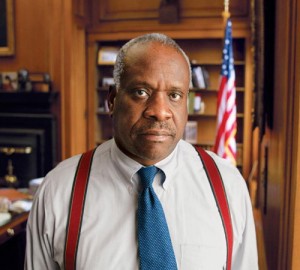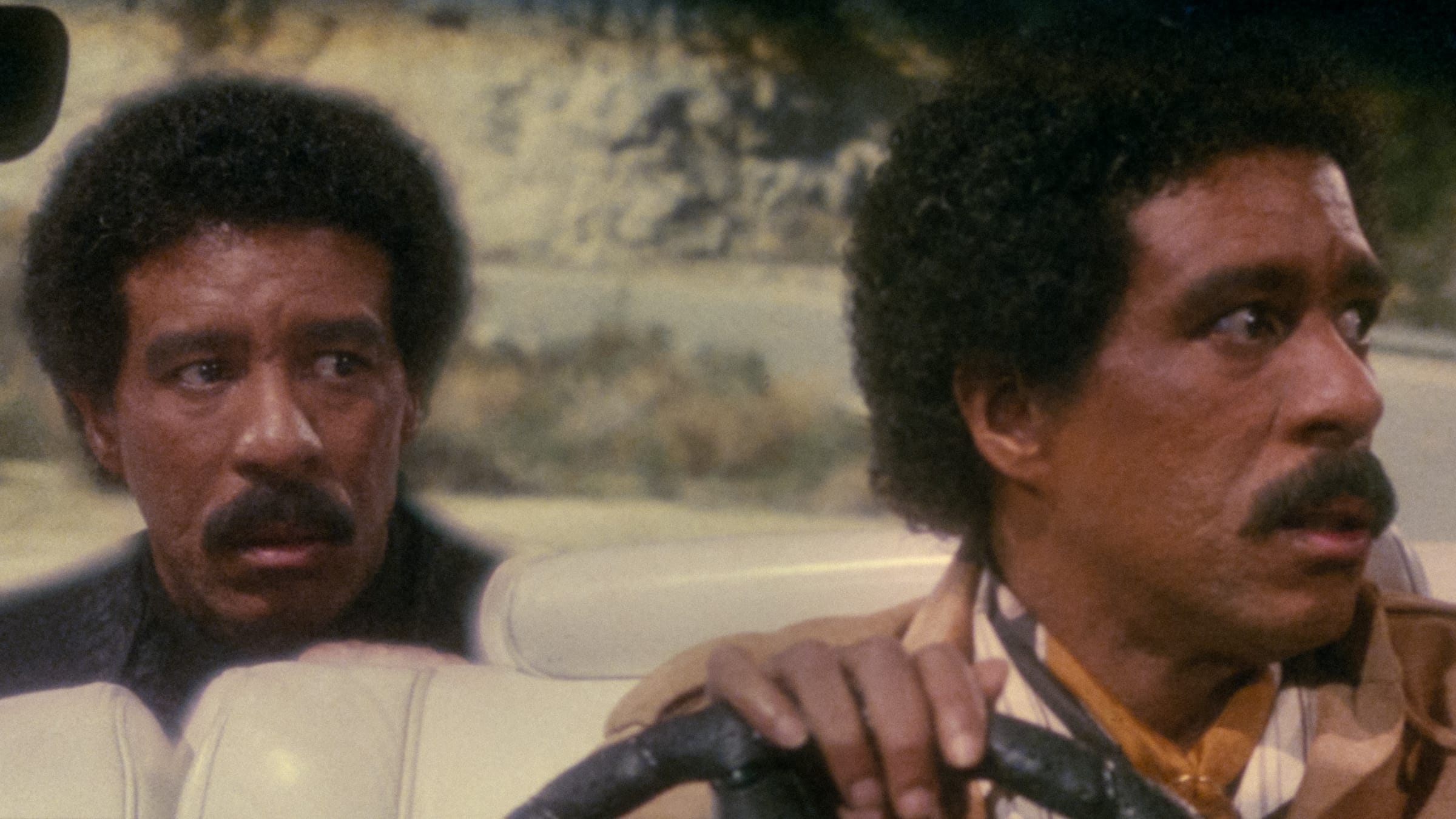(ThyBlackMan.com) It has come to my attention that Justice Clarence Thomas, the lone African American on the US Supreme Court, has not asked a question or spoken in open court in many sessions (since February 2006). While some have questioned the intellectual fire power of the Justice, I wondered if his lack of articulation might be attributable to self-consciousness over a residual “Deep South” black dialect.
Upon reflection, I believe both suppositions are weaker than a third. The prowess of Justice Thomas’ written opinions displaying fierce logical  consistency and commitment to his “originalist” philosophical conviction for constitutional interpretation weakens or refutes the former hypothesis for his silence, and his prolific schedule of speaking engagements around the country counter my suspicion.
consistency and commitment to his “originalist” philosophical conviction for constitutional interpretation weakens or refutes the former hypothesis for his silence, and his prolific schedule of speaking engagements around the country counter my suspicion.
So what better explains why Justice Thomas, whom I misguidedly supported during his confirmation hearing to become a justice of the Supreme Court, does not talk out in Court anymore? On, arguably, one of the most important issues to come before the Court for a southern born black man of Justice Clarence Thomas age, he spoke out for himself and black people, against cross burning being free speech or “protected speech” under the US Constitution and no one listened
The case involved a 1952 Virginia statute that did not require the proof of “intent” to criminally convict a person of intimidation that person was found to have burned a cross in the Commonwealth of Virginia. The law banned cross burning in the commonwealth based on its history. In 1998 Black led a group of Klansmen in a cross burning and was convicted under the statute. He had argued successfully to the Virginia Supreme Court that his cross burning was protected “free speech”. That ruling was appealed to the Supreme Court.
In Thomas’ questioning in the case, he reminded the other Justices of the repugnant signal of violence that cross burning sent during the Ku Klux Klan’s 100-year history of real “lynching” (not just the “hi-tech” variety to which he referred during his confirmation hearing). In the final vote, no one agreed with Thomas. Not one of his conservative allies. Not a moderate. Not a single liberal Justice voted with Thomas on this one.
Mike Sacks at the Huffington Post whose article I read this morning that brought this case to my attention pointed out that a Supreme Court justices often use their questions as a means to get the rest of the Court to learn what the questioning justices already know. In this case, Justice Thomas asked the Solicitor General for his understanding of the effects of cross burning to amplify the argument that cross burning rather than being “protected speech” under the First Amendment might not be more appropriated considered “like a sword of Damocles hanging over the person whose head” is being threatened.
Justice Thomas intoned that even “threatened” was too mild a term. He preferred the term “a reign of terror.”
Justice Thomas’ eloquence in this case was what I, as a rural born black Virginian, expected in my initial but misguided support of Justice Thomas’ ascension to the highest court. I expected that Thomas would educate the others in his delivery when such cases came before the court. Yet, with all the moral authority he could muster as a southern born black man, he spoke in this case as one who lived under that sword himself, but no one listened.
If on an issue of such importance, no one listened, why talk anymore he must have decided?
Staff Writer; Victor Langhorne

















This was interesting… very interesting. I know that Clarence Thomas could not have forgotten who he is and where he came from, and perhaps for one moment, he stopped trying to forget, and spoke out. I only wish he, and many of our other folks, would stop trying so hard to forget where they come from and who they really are. Maybe, just maybe, as time and age do their difficult but sometimes beneficial work, Justice Thomas will again remember, and do some of the good he still can on the court.
Thomas keep’s his mouth shut because he does not to make a fool of himself.
The simple answer is that he’s too damn dumb to ask questions and the best thing for him to do is keep his mouth shut so that it isn’t so obvious. At least give him some credit for implicitly admitting that he doesn’t even belong on the Court. Any court, except maybe a basketball court.
Richard Martin,
Your presented explanation of Justice Thomas’ silence is one I had heard him give. Yet, he was drawn to speak in this case. He had a point to make on a piece of history, psychological/social history that he was specially qualified to educate the other justices regarding. This case as no other drew him out of the alleged role of the court’s so called silent eyes. If someone had been persuaded, had listened, anyone, I contend we might, just might have heard more from this justice. I believe that despite his pact with conservatives, race still matters in the heart of brother Thomas.
According to Thomas, the lawyers submit their arguments to SCOTUS before the hearing. By time they appear before the court, the justices have already gone over the written testimony. Even so, sometimes things come up in court that wasn’t covered in the briefs, that’s why the justices have questions, but they also need an observer, someone who can keep track of the ongoing proceedings without distraction.
When you ask a question, the you follow up, there can be information you missed in the process. The court needs a set of eyes to capture dropped moments. It’s critical when that court’s ruling will be the law of the land.
So don’t think Thomas is just sitting there eating ham sandwiches.
If you’ve ever been interviewed by police detectives or the FBI, they usually have an observer to account for dropped moments.
Kimberly Keeton:
I had a moderately conservative political perspective as a southern black man back in the day. Clarence Thomas and I went to Yale University. We were there at around the same time. My attendance had been facilitated by the Danforth Foundation, which footed the bill. Thomas’ first job after Yale was facilitated by a Republican John Danforth, I believe. The Republican who brought him into politics and in a roundabout way introduced Thomas to the conservatism of his current very conservative wife might today be considered a heretic. What I was up to in the article was to try and divine what this case (the one in which Thomas spoke out most elegantly) might say about his historic silence. The title I wanted to give to the article orginally was: “Why talk, when you do and it’s important, they don’t listen?”
Justice Thomas and I shared a rural southern African American culture. By the time of his nomination to the Supreme Court as one of the youngest person ever, I placed my bet for him on the basis of the commonality of our cultural background and what I believed and hoped that that would bring to the highest court in the land on such an issues as the Virginia v Black case represented.
On this case Thomas did not disappoint me.
I had strongly urged my Democratic Senator, Charles Robb, to vote for this nominee at the time, and he did. While before and since, I have been disappointed, in this case I was not. So in ruminating about his renowned silence, I focused on this case for answer. The cross burning case was so compelling that Thomas spoke out brilliantly on an issue I understood.
Hopefully, he too will reflect. Justice Thomas has a life-time appointment with possibly decades to go.
I am really not sure where this article is going. However, I will say that Justice Clarence Thomas has a tarnished legacy. He will only be remembered for not speaking up–versus anything else in society. He was pushed into the highest court by Republicans. I for one have never understood his silence. I believe that when someone has this type of “status” in society that they should have a voice. I am not going to say that he does not have any morals or values…However, when you look at his tenure…does he?